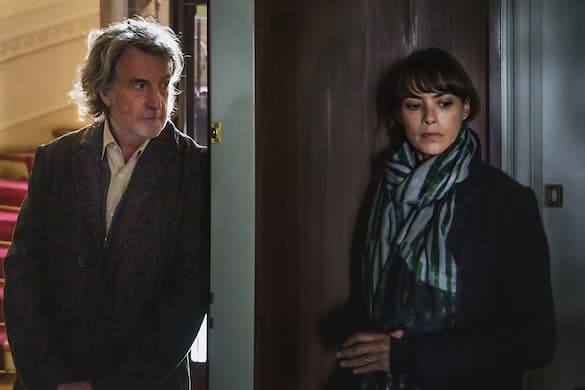The Antisemite Downstairs
While a gripping entertainment, the most compelling scenes in ‘The Man in the Basement’ are the most queasy, wherein personal and historical truths are rendered malleable enough to waylay common sense.

“The Man in the Basement,” the new film by French director Philippe Le Guay, is a gripping entertainment that is nonetheless oddly unsatisfying, perhaps even a bit timid — which is saying something, given that its subject concerns the Holocaust.
The picture opens in New York City on January 27, International Holocaust Remembrance Day. A purposeful date, to be sure, but given the peculiar byways in which the Holocaust is evoked and elaborated upon during the run of the film, the timing seems curiously applied.
The plot concerns Simon and Hélène Sandberg (Jérémie Renier and Bérénice Bejo), an attractive young couple who live in a Parisian co-op, a Byzantine edifice of winding staircases, generously scaled apartments, an interior courtyard, and a basement that seems as dank as it is labyrinthian. Simon is selling the family’s storage room and he assures an interested buyer that the space is, in fact, cool, dry and suitable for stowing one’s belongings.
Jacques Fonzic (François Cluzet), a recently retired high school history teacher, haggles with Simon on the asking price, but they make fairly quick work of brokering a deal. Maybe too quick: Simon drafts an agreement before consulting with legal counsel, both men sign off on it, and Fonzic’s check is cashed. Cleared to move in, Fonzic arrives with a burly associate and an assortment of boxes in tow.
Fonzic proves to be a peculiar sort, though. The building’s superintendent, Min (Béleina Win), informs Simon that Fonzic has, contrary to co-op rules, been sleeping in the basement. Fonzic claims that a studio apartment that he’ll be renting has run into a snag, and it’s better to sleep on a cot in the basement than to be on the street. Being something of a bleeding heart, Simon gives Fonzic a key to the guest room within the family’s home to tide him over.
All the same, Fonzic’s behavior continues to nag at Simon. A co-op member, Monsieur Lerou (an oleaginous Patrick d’Assumçao), complains about Fonzic’s living in the basement even as he gives credence to the unflattering rumors he’s been spreading about Simon. A local cafe owner of Arab descent recounts a charged encounter with Fonzic in which racist language was employed. Unbeknownst to Simon, Fonzic has bumped into Justine (Victoria Eber), his and Hélène’s daughter, and questioned the teenage girl about her religion and ethnicity.
Simon’s increasing anxiety prompts a trip to the school at which Fonzic taught. A quick chat with the principal reveals that Fonzic did not retire, but, rather, was fired due to his revisionist approach to history. The Holocaust? Its scope, according to Fonzic, has been overplayed. His opinion of world Jewry is similarly problematic. Simon’s tenant turns out to be a dyed-in-the-wool antisemite who has a significant online following.
What follows is a cat-and-mouse game of increasingly complicated dimensions, exacerbated in no small way by Simon’s relationship to his Jewish ancestry. Even as Fonzic’s actions become more blatant and aggressive — Simon’s email account being deluged by hate mail is the least of it — he proves a smooth operator. Justine is particularly vulnerable to Fonzic’s circuitous logic, arguing, as he does, that the historian’s duty is to question the received wisdom.
“The Man in the Basement” turns on an increasingly paranoid Simon, as his efforts to evict Fonsic are continually frustrated and his relationships with Hélène, Justine, the co-op board, and, for that matter, just about everyone deteriorate. Significant tension is generated by how we, as the audience, are made aware of Simon’s integrity and how it is continually muddled by other people’s perceptions.
Mr. Le Guay, who wrote the screenplay along with Gilles Taurand and Marc Weitzmann, has made a timely picture given the recent uptick in antisemitism, but art is different than the contingencies of public and political life. The most compelling scenes in “The Man in the Basement” are the most queasy, wherein personal and historical truths are rendered malleable enough to waylay common sense.
Would that “The Man in the Basement” had followed through more emphatically on its abiding absurdities, like, say, Hafsteinn Gunnar Sigurðsson’s “Under the Tree” or “Storytelling” by Todd Solondz. As it is, Mr. Le Guay’s film is less freighted than it could be even as it places itself squarely on the side of the angels. That’s not to say it won’t place the audience on the edge of its collective seat.

